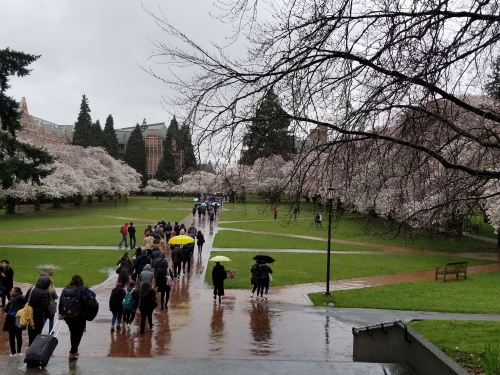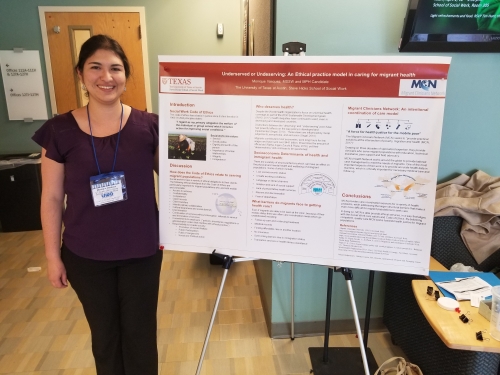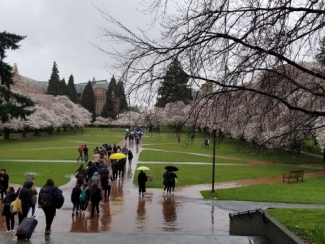In the Field: Latino Social Workers Come Together in Seattle

[Editor’s Note: Congratulations, Monique, Health Network Intern, from UT Austin Steve Hicks School of Social Work! Her poster presentation on Health Network was accepted at the Latino Social Workers Organization Conference. Here, she reflects on the conference and her work as an intern and social worker.]
Last month, I found myself among a diverse group of Latinx social workers, walking together under the cherry blossoms that are central to the University of Washington campus, shivering as it rained and lightly snowed. We had joined there in Seattle for the Latino Social Workers Organization Conference, where I was to present my poster, “Underserved or Undeserving: An ethical practice model in caring for migrant health.” After a year of difficult policies, and national and international tragedies and disasters, the conference theme, “Breaking Down Walls and Abriendo Puertas: Promoting Justice in Social Work Practice” was too poignant and timely to ignore.
Being a Latinx social work student can feel isolating at times. Although there are more of us joining the field, people of color continue to be underrepresented in professional networks. This is particularly frustrating when people from communities of color have disproportionate outcomes across all systems. If you are a person of color in social work, it is likely that you look more like the people who are receiving services than your peers. It was empowering to be in a room full of social workers who identify as Latinx, who have personal connections to issues facing Latinx communities and who are willing to question outdated ethnocentric social work models; even when well meaning, these models can stereotype communities, misattribute behavior or negative traits, or stigmatize communities of color, and when left unchallenged can attribute to the perpetuation of systemic racism in social services.
My conference poster reviewed the barriers that mobile patients face in receiving care, and the way in which MCN’s Health Network ethically met the needs of mobile populations. I was inspired to create the poster after a discussion at MCN about how the word “underserved” could too easily be read as “undeserved”. This is chilling because the literature I have reviewed as an MCN intern often discusses how mobile patients are told either explicitly or subtly that they do not deserve services. Social workers do not generally say that people do not deserve services, but it is far too easy to call people “non-compliant” or to say that they do not value services than it is to address the barriers they face. My poster reviewed the ethical obligations that are described in the Social Work Code of Ethics in order to show the need for healthcare and social services to ethically serve and consider the needs of mobile populations.
 The Social Work Code of Ethics is a guide for social workers created by the National Association of Social Workers. My first assignment as a social work student was to read and study the code, which is referenced frequently during my classes and in field internship settings where students gain hands-on experience. It is expected that we reflect on the code when we encounter ethical dilemmas, which can range from interpersonal conflicts in clinical practice to systemic and structural problems in society. When I reread the code in anticipation of the conference, it was easy for me to see how the social work core values of “service, social justice, dignity and worth of the person, importance of human relationships, integrity, and competence” fit with the work that I see MCN’s Health Network Associates engaging in on a daily basis. This organization’s dedication to working with mobile patients and their health care providers is clear to me, even when mobile patients have historically been told that they do not deserve social services because of their work status, their immigration status, their race, or socioeconomic status.
The Social Work Code of Ethics is a guide for social workers created by the National Association of Social Workers. My first assignment as a social work student was to read and study the code, which is referenced frequently during my classes and in field internship settings where students gain hands-on experience. It is expected that we reflect on the code when we encounter ethical dilemmas, which can range from interpersonal conflicts in clinical practice to systemic and structural problems in society. When I reread the code in anticipation of the conference, it was easy for me to see how the social work core values of “service, social justice, dignity and worth of the person, importance of human relationships, integrity, and competence” fit with the work that I see MCN’s Health Network Associates engaging in on a daily basis. This organization’s dedication to working with mobile patients and their health care providers is clear to me, even when mobile patients have historically been told that they do not deserve social services because of their work status, their immigration status, their race, or socioeconomic status.
Beyond the stigma of immigration, the mobile populations that MCN works for faces the additional challenge of accessing care on the move. It’s difficult enough to establish care in a new setting but barriers such as low-socioeconomic status, demanding work hours coupled with unsafe working conditions, language and literacy barriers, fear of deportation, discrimination and limited access to close, affordable clinic make it overwhelming to access and continue care. It is unethical for mobile people to navigate a complex global health system on their own.
Our responsibility as social workers does not start and end when we see our clients in front of us, but we must work to ensure that care coordination extends beyond state and national borders. Our commitment does not stop at diversity and cultural competence. Social workers have a responsibility to promote social welfare, to support social and political action. The people in MCN’s Health Network focus on building bridges so that mobile patients can access the medical services they need wherever they are through technology, medical case management and follow-up.
- Log in to post comments
